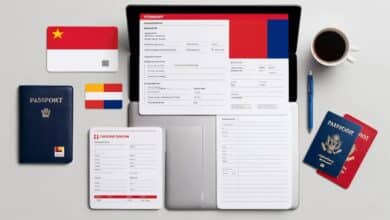All You Need to Know About Visa Sponsorship and Marriage Visas in Italy
Italy remains a top European destination for international couples seeking long-term residency through family ties.
The country provides clear pathways for partners of citizens or residents, whether through spousal routes or broader family reunification programs. Understanding these options helps applicants choose between marriage-based permits and other family member eligibility criteria.
Key distinctions exist between direct spousal applications and extended family member petitions. Civil unions, including same-sex partnerships, receive equal recognition under Italian immigration law. Financial stability proofs and proper housing documentation form the foundation of successful applications.
Recent reforms have simplified some processes, but challenges persist with multi-agency coordination. Applicants typically interact with local municipal offices, national immigration authorities, and Italian consulates abroad. Processing timelines vary significantly based on individual circumstances and regional workloads.
Essential preparation includes gathering marriage certificates, proof of relationship authenticity, and sponsor income verification. Non-EU nationals often benefit from professional guidance when navigating Italy’s bureaucratic landscape. Proper planning reduces delays in obtaining healthcare access and work authorization during the transition period.
Visa Sponsorship and Marriage Visa in Italy: Eligibility and Requirements
Securing family-based residency in Italy demands meeting specific legal benchmarks. Two primary factors govern approval: personal eligibility conditions and material support capabilities.
Personal Qualifications for Applicants
Italian law requires both partners to be 18+ or have parental consent. Divorced women must submit non-pregnancy certificates if their previous marriage ended within 300 days. Authorities verify mental competency through medical assessments and review family trees to prevent relative marriages.
Economic and Housing Standards
Sponsors must show €6,542.51 annual income, plus €3,271.26 per additional family member. The housing suitability certificate confirms adequate living space through municipal inspections. Civil union partners enjoy identical rights, whether same-sex or international couples.
Non-EU sponsors with valid permits can initiate applications. Student visa holders need extra financial proofs. All documents require certified translations for submission to questura immigration offices.
Essential Procedural Steps and Documentation for a Successful Application
Navigating Italy’s residency pathways requires meticulous preparation and adherence to specific protocols. Applicants must follow a structured sequence of actions to ensure their paperwork meets legal standards.
Obtaining the Nulla Osta and Legal Translations
The process begins with securing a nulla osta from the applicant’s home country. This certificate confirms no existing marriages or legal barriers prevent union recognition. Documents like birth certificates and divorce decrees need apostille stamps or consular authentication.
Certified translations into Italian must accompany all foreign-language materials. Approved translators ensure authorities can verify financial records and accommodation proofs without delays.
Submission of Documentation to Italian Authorities
Couples file declarations of intent at municipal civil registers before submitting complete dossiers to local town halls. Family reunification cases require sponsors to obtain preliminary approval from Prefecture Immigration Desks.
Non-EU nationals apply through Italian consulates abroad, scheduling interviews to confirm relationship authenticity. Successful applicants must request residence permits within eight days of arrival. Final steps include fingerprinting at police stations and verifying original documents.
Understanding Time Frames and Processing Details
Managing expectations around timelines proves critical for successful residency applications. Delays often stem from document verification processes or regional administrative backlogs.
Application Processing Periods and Expected Durations
Marriage-related applications generally take 3-6 months from initial paperwork to final approval. This includes collecting the nulla osta and scheduling ceremonies. Family reunification cases typically resolve faster, averaging 2-3 months post-approval.
Three key factors influence processing speed:
- Consulate workload during peak seasons
- Document translation accuracy
- Background check requirements
Non-EU applicants should account for extra verification steps. Some consulates process requests in 3 weeks, while others take 6 months.
Renewal, Permanent Residence, and Long-Term Considerations
Residence permits for family members mirror the sponsor’s permit duration. Renewals demand updated financial proofs and housing certificates. Applicants must maintain continuous residency for five years to qualify for permanent status.
Essential long-term requirements include:
- A2 Italian language certification
- Consistent tax payments
- Limited absences from Italy
Strategic planning helps avoid gaps in healthcare access or work authorization. Early preparation of tax records and language test schedules smooths the path to citizenship.
Visa Options for Family Reunification and Accompanying Members
Italy’s family reunification policies enable foreign residents to maintain household unity while complying with immigration rules. This pathway supports sponsors holding valid permits for work, study, or investment purposes, allowing them to bring close relatives under specific conditions.
Eligibility Guidelines for Accompanying Family Members
Sponsors must meet financial thresholds and housing standards to qualify. The minimum annual income requirement starts at €11,000 for the first relative, increasing by €3,500 per additional member. Accommodation certificates verify living spaces meet local health and size regulations.
Eligible relatives include:
- Spouses or civil union partners
- Children under 18
- Disabled adult children requiring financial support
- Parents over 65 without other caregivers abroad
Special rules apply for elderly parents. Sponsors must prove siblings in their home country cannot provide adequate care. Private health insurance becomes mandatory for family members aged 65+.
Step-by-Step Process for Family Reunion Applications
Applications begin with obtaining a nulla osta clearance from Italian immigration authorities. Sponsors submit proof of income, housing certificates, and relationship evidence to local prefectures.
Key stages include:
- Consular interviews verifying family ties
- Residence permit requests within 8 days of arrival
- Fingerprint registration at police stations
Approved relatives gain work rights through their residence permits. Early preparation of tax records and medical coverage documents helps avoid processing delays. Most cases resolve within 3-6 months when documentation meets all requirements.
Conclusion
Navigating Italy’s family-based residency pathways demands careful strategy. Applicants must balance financial proofs, housing standards, and procedural timelines to secure approval. Key documents like the nulla osta and residence permits form the backbone of successful applications.
Financial stability remains critical throughout the process. Sponsors should prepare income statements exceeding €11,000 annually for initial family members. Housing certificates must confirm adequate living conditions per municipal regulations.
Timing proves equally vital. Most cases require 3-6 months for processing, with consular workloads affecting regional variations. Early preparation of translated documents reduces delays during background checks.
Long-term success hinges on continuous compliance. Maintaining tax records, language certifications, and limited absences strengthens permanent residence claims after five years. Legal guidance often streamlines complex steps like civil union recognition or family reunification petitions.
Italy’s framework supports diverse households through spouse visas and extended family programs. With meticulous planning, couples can establish stable lives while meeting all legal requirements for citizenship eligibility.
For more information, explore the official visa website mentioned in this article:
You will be redirected to another website
FAQ
What are the eligibility criteria for a spouse visa in Italy?
Applicants must prove a legally recognized marriage or civil union, provide evidence of accommodation, and demonstrate sufficient financial stability. Both partners must be at least 18 years old, and the sponsoring spouse must have a valid residence permit or Italian citizenship.
How can applicants prove financial stability for a family reunification visa?
Sponsors must show a minimum annual income of €8,500–€11,500, depending on family size. Documents like employment contracts, tax returns, or bank statements are required. Self-employed individuals may submit business registration or profit statements.
What documents are needed to obtain a nulla osta for marriage?
Couples must submit a valid marriage certificate, apostilled or legalized by the Italian consulate. Non-EU documents require certified translations. Proof of accommodation and the sponsor’s residence permit or citizenship certificate are also mandatory.
Where should applicants submit their spouse visa documentation?
Applications are filed at the local immigration office (Sportello Unico per l’Immigrazione) or police headquarters (Questura). Non-EU applicants must apply through the Italian consulate in their home country before entering Italy.
How long does a marriage-based residence permit take to process?
Processing typically takes 30–180 days. Delays may occur if additional documentation is requested. Temporary permits are issued during processing, allowing legal stay in Italy.
Can family members apply for residence permits alongside the main applicant?
Spouses, minor children, and dependent parents may apply for family reunification. Each member must provide proof of relationship, such as birth or marriage certificates, and meet health insurance requirements.
What steps are required to renew a family-based residence permit?
Renewal applications must be submitted 60 days before expiration. Updated proof of income, accommodation, and a valid passport are required. Permanent residence eligibility begins after five years of continuous legal stay.
Are civil unions recognized for visa sponsorship in Italy?
Yes. Civil unions registered in Italy or recognized through international agreements qualify for family reunification. Partners must provide a valid union certificate and meet standard financial and accommodation criteria.
Do investors qualify for expedited family visa processing?
Investors under the Italy Investor Visa program may receive priority processing for family reunification. They must meet the €250,000–€2,000,000 investment threshold and comply with the special tax regime for foreign workers.
Is health insurance mandatory for family visa applicants?
Non-EU citizens must enroll in the Italian National Health Service or provide private insurance covering €30,000 annually. EU citizens can use the European Health Insurance Card (EHIC) during the application process.
Published on: 4 de July de 2025







